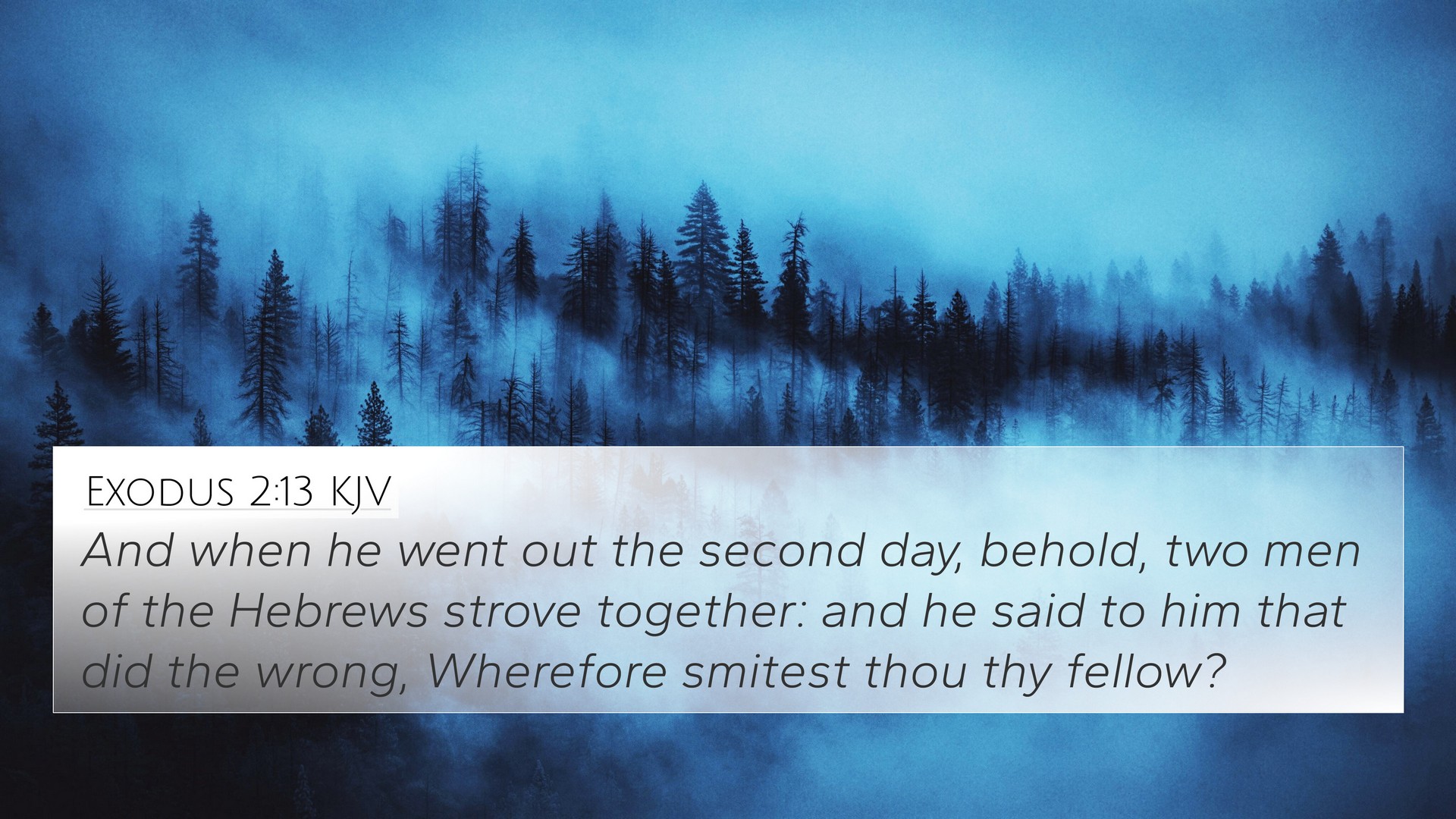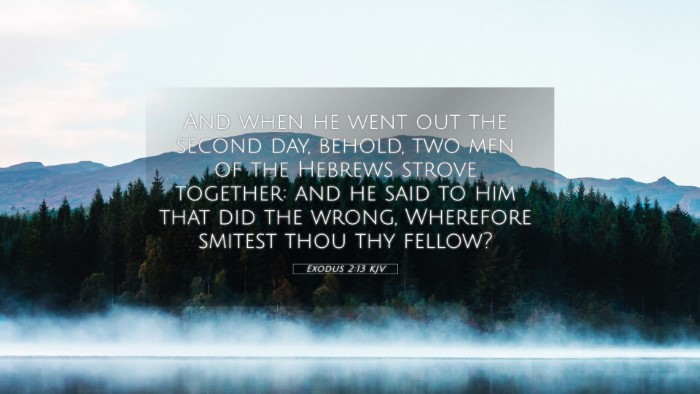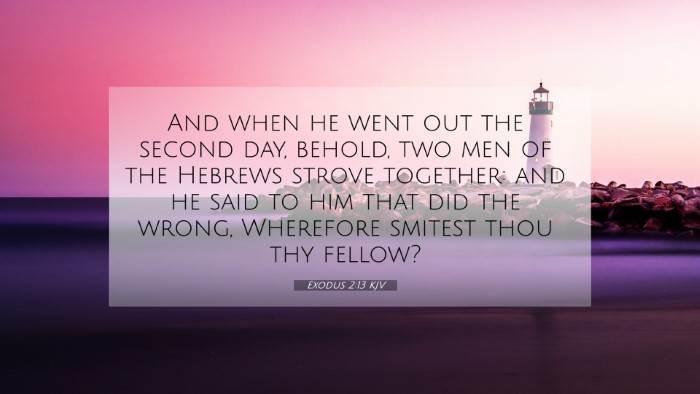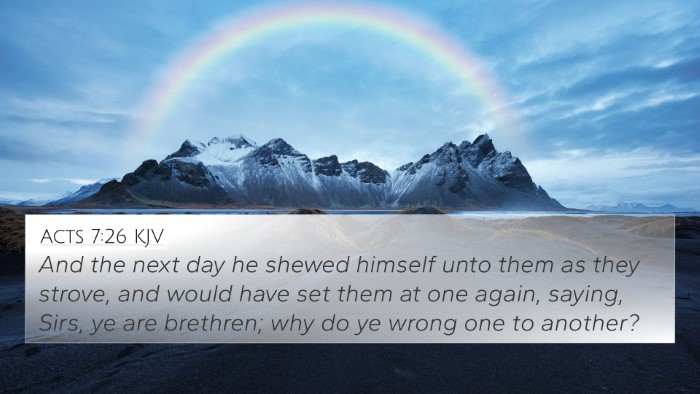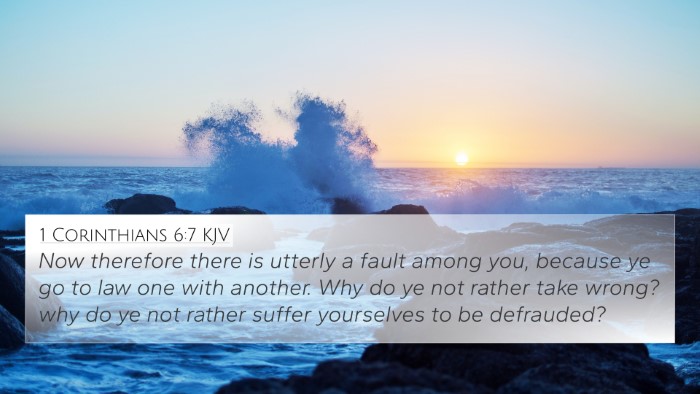Understanding Exodus 2:13
Bible Verse: Exodus 2:13 - "And when he went out the second day, behold, two men of the Hebrews strove together: and he said to him that did the wrong, Wherefore smitest thou thy fellow?"
Summary of Meaning
This verse captures a pivotal moment in the life of Moses, where he attempts to intervene in a conflict between two Hebrew men. The action of Moses reflects his deep identification with his fellow Israelites, showcasing both his compassion and the inner turmoil stemming from the injustices his people faced under Egyptian rule.
Interpretative Insights
- Matthew Henry Commentary:
Matthew Henry emphasizes that Moses' action of intervening demonstrates not just a sense of responsibility but also a nascent call to lead his people. He reflects on Moses' deep sense of justice and righteousness, questioning the moral fabric of the actions of the Hebrews in their oppressed state.
- Albert Barnes Commentary:
Barnes points out the irony in Moses' efforts to restore peace among the Hebrews, as they are unaware that he himself is a target of their scorn for having grown up in Pharaoh's house. This verse alludes to the complexity of Moses' identity and foreshadows his struggle between Egyptian privilege and his Hebrew heritage.
- Adam Clarke Commentary:
Clarke explores the motivations behind Moses' question, highlighting that it signifies his desire for harmony and his distaste for violence. He discerns that Moses’ intervention is indicative of the broader theme of social justice found throughout the scriptures, as it aligns with God's will for His people.
Connections and Cross-References
Exodus 2:13 can be linked to several other Bible verses that resonate with its themes of justice, identity, and leadership:
- Acts 7:24-25: This passage recounts Stephen's remarks about Moses and hints at his intended role as a deliverer.
- Hebrews 11:24-26: Discusses Moses choosing to identify with his oppressed people rather than enjoy the pleasures of Egypt.
- Genesis 45:4-5: Joseph's reconciliation with his brothers demonstrates similar themes of familial confrontation and understanding.
- Luke 4:18-19: Jesus reads from Isaiah, invoking His mission to free the oppressed, aligning with Moses' heart for justice.
- Numbers 12:1-2: Highlights the tensions Moses faced from his own people due to his separation from their struggles.
- Isaiah 1:17: Calls for justice and encourages the seeking of righteousness, echoing Moses' sentiments.
- Matthew 5:9: Blessed are the peacemakers, reflecting Moses’ intentions in stepping into conflict.
- Galatians 5:13: Paul speaks about serving one another in love, resonating with Moses' appeal to the Hebrew men.
- Proverbs 31:8-9: Speaks to the responsibility of speaking up for the oppressed, a principle embodied by Moses.
- James 4:1: Discusses the source of conflicts among people, linking back to the strife seen in Exodus 2:13.
Thematic Connections
The themes found within Exodus 2:13 can be seen throughout Scripture, underscoring important concepts about identity, justice, and leadership:
- Identity and Heritage: Moses grapples with his dual identity, paralleling themes in the New Testament regarding belonging (John 1:12-13).
- Justice and Righteousness: The call for justice resonates throughout both the Old and New Testaments (Amos 5:24, Micah 6:8).
- Conflict Resolution: Moses’ attempt to resolve strife foreshadows Jesus’ teachings on reconciliation (Matthew 18:15).
- Leadership and Calling: The essence of divine calling is seen in Moses’ encounter and is echoed in the lives of other biblical figures (1 Samuel 16:7, Acts 13:22).
Tools for Cross-Referencing
When studying verses like Exodus 2:13, utilizing cross-referencing tools can enhance understanding:
- Utilize a Bible concordance to find related verses and themes.
- Employ a cross-reference Bible study that guides through similar biblical narratives.
- Incorporate a Bible cross-reference guide during your study sessions for deeper insights.
- Explore comprehensive Bible cross-reference materials for thematic studies linking multiple scriptures.
Conclusion
Exodus 2:13 serves as an essential passage that illuminates the complexities of leadership, compassion, and social justice as exemplified in Moses' actions. By engaging with this verse alongside its cross-references, one is invited to explore the broader thematic connections within the biblical narrative, encouraging a deeper understanding of scripture.
